
Is anti-capitalism still in fashion? Irony for a world that has run out of humour
Let's start from relatively far away. Two weeks ago, Jordanluca's jeans, artistically stained to simulate the effects of incontinence, went viral, resulting in a +1000% increase in traffic to the brand's website. Contacted by Vogue, the two designers clarified that these jeans will no longer be produced because "the jeans are a commentary on the fact that we don't really need more clothes, but we have an obsessive love affair with objects. Consumerism is an obscene fetishism. We buy things not because we need them, but because they turn us on emotionally." And the decision not to produce more jeans was motivated by the desire not to participate in the "spiral of viral consumerism" which would then be the glaring contradiction of criticizing capitalism while feeding it – a contradiction that has been debated for some time, referring to Demna, who founded the new Balenciaga aesthetic precisely on anti-capitalist irony. But the anti-capitalist irony of Jordanluca and its "archetype," that of Demna, which have many precedents in the history of fashion, must now compete with a different historical atmosphere, a different type of social disillusionment, and above all a certain moral and identity "void" of fashion which has led society far beyond irony, to a place where there is not much to laugh about. More specifically, that place was, last week, the red carpet of the Met Gala where, against the backdrop of this procession of waste, extravagance, and wealth, there were both pro-Palestine protests stopped only by a police cordon and a series of metal barriers a block away; and those, narrowly avoided, of Condé Nast employees on strike, satisfied with their demands just to keep the streets clear.
Where was the irony? In the fact that the theme of the Met Gala itself was drawn from The Garden of Time, a tale by James Graham Ballard that precisely tells the story of two aristocrats secluded in their garden, trying to escape the arrival of a ragged and enraged crowd heading towards them with ill intentions. A very meta-narrative touch for an event that ultimately, as Vanessa Friedman recounts in the New York Times, went off without major issues (The Guardian says the crowd was stopped a block away) leaving the tonal conflict only on a potential and metaphorical level. Nevertheless, the fact that this peace and serenity were so close to tipping into embarrassment, as happened to some guests at the White House Correspondents' Dinner, is an indication of a climate that is perhaps not sad, but not relaxed enough to make room for any irony. This also applies to the luxury brands involved who, this year more than others, insisted on creating these clothes, on craftsmanship, and on the technical difficulty of their production and therefore, on their absolute seriousness – fashion is not a waste of money if we recognize its artistic status or material value. The demonstration of these two latter factors seemed to be fixed in the minds of the brands, also outside the Met Gala, considering that social media news feeds are flooded with close-up videos extolling the manual skill of artisans (always represented as disembodied hands, deprived of face or identity), where the press is brought to visit factories in Tuscany or Umbria and where the show notes of many shows become enumerations of workings or finishes.
Hundreds of people in NYC marched on the Metropolitan Museum of Art, where Met Gala 2024 was held, to protest the ongoing Israeli genocide in Gaza. pic.twitter.com/PJJdec8PYJ
— PALESTINE ONLINE (@OnlinePalEng) May 7, 2024
If we were to talk about fashion irony, indeed, we should look for it in the depths of Vinted, where the new trend is to search for the most banal jokes and puns to buy t-shirts that stand out precisely for their vaguely cringe nature. Fuck Me I'm Famous and FBI: Female Body Inspector are among the first examples that come to mind. But this remains an irony light-years away from that of Vetements or Balenciaga – and it is no coincidence that Jordanluca's gimmick, despite its success and having led to the stock exhaustion of the so-called "pee jeans," was criticized by a large part of the public who did not believe in the artistic value of the product. Nevertheless, there is truth in the statement of the two designers about buying clothes that "turn us on emotionally" so much so that often, even in buying, and especially in these boring times of quiet luxury that transforms many boutiques into a symphony of light beiges and pale blues, it is the shocking and surprising dress that is noticed first, tried on next, and finally bought, if all goes well. According to the Vogue article in which the Jordanluca designers intervened, there is also the phenomenon of cost signaling, that is, the feeling of superiority that comes from wearing a notably ugly garment, demonstrating either having money to throw out the window or having understood a joke that many others have not grasped. After all, if bad taste already stands out on its own, the taste for the outrageous can easily pass for artistic sophistication.
But, as mentioned earlier, the collective culture at the moment is thinking about other things, moving towards a more literal notion of the value of products and away from the idea that fashion is some kind of patina to apply to extremely simple or extremely strange objects. However, as Imran Amed wrote in an op-ed in BoF, the idea of value-for-price is gaining more and more ground among fashion customers, even the least "informed" ones, especially now that the large number of resale platforms, such as Vinted, Vestiaire Collective, and The RealReal, give an idea of how easily luxury loses its value once out of the store. On the other hand, our habit of this type of ironic fashion has dulled its edge: for every fan of Jordanluca's jeans, there were two or three detractors, and that without mentioning the fact that an identical product concept (jeans with a stain on the crotch) had already been produced by designer Di Petsa in 2019, demonstrating the relative narrowness and creativity of these gimmicks that, indeed, end up repeating or flattening around a slogan. According to the biggest specialist in this type of humor, namely Demna, who addressed this point in the video interview Rethinking Heritage, there is no unequivocal answer to the contradiction:
"It's a very conflicting question for me. I still don't know how to handle it. Sometimes it makes me angry, sometimes I just forget about it and let go because there are things I can't change. It's life. […] I have a kind of love-hate relationship with the concept of fashion in general […] It makes me angry when I hear people who know my work, who have followed it for years, who like what I do but cannot buy it. […] It's like walking on a razor's edge."











































